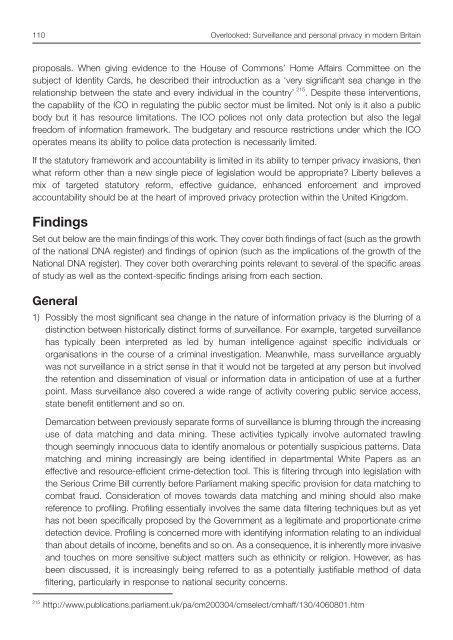Overlooked - Liberty
Overlooked - Liberty
Overlooked - Liberty
Create successful ePaper yourself
Turn your PDF publications into a flip-book with our unique Google optimized e-Paper software.
110 <strong>Overlooked</strong>: Surveillance and personal privacy in modern Britain<br />
proposals. When giving evidence to the House of Commons’ Home Affairs Committee on the<br />
subject of Identity Cards, he described their introduction as a ‘very significant sea change in the<br />
relationship between the state and every individual in the country’ 215 . Despite these interventions,<br />
the capability of the ICO in regulating the public sector must be limited. Not only is it also a public<br />
body but it has resource limitations. The ICO polices not only data protection but also the legal<br />
freedom of information framework. The budgetary and resource restrictions under which the ICO<br />
operates means its ability to police data protection is necessarily limited.<br />
If the statutory framework and accountability is limited in its ability to temper privacy invasions, then<br />
what reform other than a new single piece of legislation would be appropriate <strong>Liberty</strong> believes a<br />
mix of targeted statutory reform, effective guidance, enhanced enforcement and improved<br />
accountability should be at the heart of improved privacy protection within the United Kingdom.<br />
Findings<br />
Set out below are the main findings of this work. They cover both findings of fact (such as the growth<br />
of the national DNA register) and findings of opinion (such as the implications of the growth of the<br />
National DNA register). They cover both overarching points relevant to several of the specific areas<br />
of study as well as the context-specific findings arising from each section.<br />
General<br />
1) Possibly the most significant sea change in the nature of information privacy is the blurring of a<br />
distinction between historically distinct forms of surveillance. For example, targeted surveillance<br />
has typically been interpreted as led by human intelligence against specific individuals or<br />
organisations in the course of a criminal investigation. Meanwhile, mass surveillance arguably<br />
was not surveillance in a strict sense in that it would not be targeted at any person but involved<br />
the retention and dissemination of visual or information data in anticipation of use at a further<br />
point. Mass surveillance also covered a wide range of activity covering public service access,<br />
state benefit entitlement and so on.<br />
Demarcation between previously separate forms of surveillance is blurring through the increasing<br />
use of data matching and data mining. These activities typically involve automated trawling<br />
though seemingly innocuous data to identify anomalous or potentially suspicious patterns. Data<br />
matching and mining increasingly are being identified in departmental White Papers as an<br />
effective and resource-efficient crime-detection tool. This is filtering through into legislation with<br />
the Serious Crime Bill currently before Parliament making specific provision for data matching to<br />
combat fraud. Consideration of moves towards data matching and mining should also make<br />
reference to profiling. Profiling essentially involves the same data filtering techniques but as yet<br />
has not been specifically proposed by the Government as a legitimate and proportionate crime<br />
detection device. Profiling is concerned more with identifying information relating to an individual<br />
than about details of income, benefits and so on. As a consequence, it is inherently more invasive<br />
and touches on more sensitive subject matters such as ethnicity or religion. However, as has<br />
been discussed, it is increasingly being referred to as a potentially justifiable method of data<br />
filtering, particularly in response to national security concerns.<br />
215<br />
http://www.publications.parliament.uk/pa/cm200304/cmselect/cmhaff/130/4060801.htm















